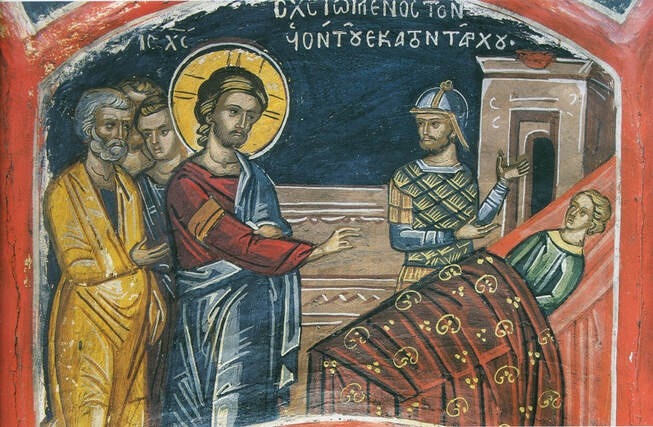 I wonder what you would list if asked “What should you believe in?” That very question was asked in a recent survey, the result of which is as follows – 1. Yourself. 2. Others (the goodness of). 3. The power of kindness. 4. That this too shall pass. 5. Your inner strength. 6. Courage. 7. Hope. 8. Your influence on the world around you. 9. The truth. 10. The power of words. 11. Hard work. 12. Your goals and dreams. 13. Change. 14. Forgiveness. 15. Your power over your thoughts and feelings. 16. Learning. 17. Self-discover. 18. Fairness. 19. Humanity. 20. Peace. Now, I don’t know about you, but I find this list very disappointing; not least because belief in ‘self’ comes top! What we ‘believe’ is so very important!
If what we believe shapes our thoughts, and determines our perception of reality, then I think we can agree with A W Tozer that, “What comes into our minds when we think about God is the most important thing about us” I am sure we are all very familiar with today's gospel reading. We have all read, or heard, how a Roman centurion asks Jesus for his help because his servant is ill. Jesus offers to go to the centurion's house to perform a healing, but the centurion hesitates and suggests that Jesus' word of authority would be sufficient. Impressed, Jesus comments approvingly, “Verily I say unto you, I have not found so great faith, no, not in Israel.” The servant is then healed that same day. How did Jesus know this man, this Roman centurion had faith? When we truly believe in something, we think and act in ways to make it real. This is why the Apostle James tells us that “faith without works is dead” (James 2v26). So, what are the ‘works, which accompany the centurion’s faith. Well, He sought healing for his servant. This is an account of a person beseeching our Lord on behalf of another, resembling other Gospel events such as Jairus and the Syro-Phoenician women praying for their daughters (Mark 5:23; 7:24-30). These are accounts of intercessory prayer, intercession being a “supplication to God on behalf of another person.” To pray for others is the most critical skill we can learn. In fact, we cannot learn any higher form of prayer unless we learn to pray for others. This is because ardent, frequent prayer for others embodies two great virtues, love and faith. We are self-centred creatures; remember what came top of the most important things to believe! - and rarely think of others and even more rarely feel their pain, but our Lord knows it. We are called to become like our Lord, to have His heart. He cares for all people, at all times. We cannot claim to know God if we do not love, and according to the scriptures, we cannot love God unless we love our neighbour (1 John 4:20) We also express our faith when we pray for others, because we poor, weak creatures are afflicted with the delusion that we somehow can control things. The truth is, only God can heal, without God nothing is good. Praying for others contradicts and rebukes this foolish self-reliance. So, how can we learn and develop our intercessory prayer? There are practical and spiritual considerations. The most important consideration is that we make a commitment to pray for others, and value doing it as much as breathing. It is not always easy, and our passions and the ‘enemy’ will continually try to distract us. If we do not have a resolute heart, we will make very little progress. It can help if we make a list of people to pray for; family, friends, clergy. Absolutely, all of your enemies, and everybody you do not like, or have any estrangement with. Of course, the sick, and those for whom we have been asked to pray, together with all of members of our parish. Ideally, we should pray for everyone on the list, at least once every day. This should not be rushed. This is not about firing off a bunch of names after saying a few quick prayers in the morning or evening. We should give our intercessions the time and the environment they deserve When we intercede for others all we need do is ask for God’s mercy. Mercy, not in the legal sense but God’s mercy; His undeserved, freely given, unconditional love. And because of this, His love for us, He will help us in every way, but only if we ask, and if we try to live according to His will. The power of belief is, itself, something to believe in. When we believe in something, you think and act in ways to make it real. So, choose what you believe in carefully. The Orthodox Church firmly believes in the power of prayer and intercessions. Do you?
0 Comments
Leave a Reply. |
Parish Blog
This mainly contains homilies and messages from our priests, although there is some scope to share thoughts and interesting articles which we may want to share with others Archives
October 2022
Categories |
 RSS Feed
RSS Feed